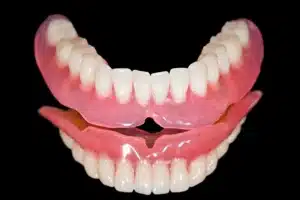The quest for the perfect smile has led many individuals to consider various dental cosmetic treatments. Among these, dental veneers have gained immense popularity, promising to deliver that picture-perfect smile we often see on celebrities and models. As the demand for this cosmetic solution rises, one question remains top-of-mind Are veneers permanent?
At Normandale Dental, located in the heart of Bloomington, MN, we encounter this question frequently. So, let’s delve deeper into the nature of dental veneers and uncover the truth about their permanency.
What Are Dental Veneers?
To understand their permanence, we first need to comprehend what dental veneers are. Essentially, veneers are thin shells made of porcelain or composite resin that are bonded to the front surface of your teeth. They are custom-made to fit your teeth and are used to correct various dental imperfections such as discoloration, chips, gaps, or misaligned teeth.
The Process of Getting Veneers
When patients opt for porcelain veneers, a small amount of tooth enamel – typically less than a millimeter – is removed. This ensures that the veneer fits correctly and looks natural. Since the enamel doesn’t grow back, this process is irreversible, meaning that once you get veneers, there’s no going back to your original tooth structure.
After this, a mold of your teeth is taken, which is sent to a dental laboratory to craft the veneers. This usually takes a few weeks. Once ready, the veneers are bonded to your teeth using a strong adhesive. This adhesive is meant to last for a long time, ensuring that the veneers stay in place.
Are They Permanent?
In the most technical sense, veneers are not “permanent” if by permanent we mean “last forever.” However, they are permanent in the context that they are a lifelong commitment because of the change they cause to the original teeth. Once you’ve opted for veneers, there’s no turning back to the way your teeth used to be.
Durability & Lifespan
Veneers, especially those made of porcelain, are quite durable. With proper care, they can last anywhere between 10 to 15 years, and sometimes even longer. However, like most dental restorations, veneers are subject to wear and tear and might require replacement at some point in your life.
Factors that determine the lifespan of veneers include:
Material Used
Porcelain veneers tend to last longer than composite resin veneers.
Oral Hygiene Practices
Regular brushing, flossing, and professional dental cleanings can extend the life of your veneers.
Personal Habits
Chewing on hard objects, grinding your teeth, or using your teeth as tools can reduce the lifespan of veneers.
Why Choose Veneers?
Despite the commitment, there are several compelling reasons to opt for veneers:
Natural Appearance
Veneers are custom-made to match your teeth, providing a very natural look.
Stain Resistance
Porcelain veneers resist stains better than natural teeth, ensuring a whiter smile for longer.
Minimal Invasiveness
Compared to other dental procedures, veneers require minimal removal of the tooth structure.
Versatility
They can correct a range of dental imperfections, from discoloration to minor misalignments.
Care for Your Veneers
To maximize the lifespan of your veneers:
Practice Good Oral Hygiene
Brush and floss regularly.
Avoid Hard Foods
Be cautious with foods like hard candies or ice.
Wear Protection
If you grind your teeth at night, wear a night guard.
Regular Dental Check-ups
Visit your dentist regularly for cleanings and check-ups.
Book an appointment today at Normandale Dental In Bloomington.
In conclusion, while veneers are not “forever,” they are indeed a long-term commitment. They require meticulous care and might need replacement after a decade or more. But with the transformation they offer, many find this commitment worth it. our team at Normandale Dental in 5300 Hyland Greens Dr #100, Bloomington, MN 55437 is here to answer all your questions and guide you through the process. We aim to help you achieve the smile you’ve always dreamt of!
Dental Veneers FAQs at Normandale Dental, Bloomington, MN
What are dental veneers made of?
Dental veneers are primarily made of two materials: porcelain and composite resin. Porcelain veneers are popular due to their natural appearance and stain resistance, while composite resin veneers are thinner and require less removal of the tooth surface.
How long do dental veneers typically last?
With proper care, veneers can last anywhere between 10 to 15 years. The exact duration depends on the material used, individual oral hygiene practices, and personal habits.
Is the veneer procedure painful?
The veneer process is typically minimally invasive and usually painless. Some patients might experience slight discomfort or sensitivity, but local anesthesia can be used to ensure comfort during the procedure.
Can I get veneers if I have gum disease or other dental issues?
Before considering veneers, any underlying dental issues, including gum disease, cavities, or decay, need to be addressed. It’s essential to have a healthy oral foundation before getting veneers. Consulting with our professionals at Normandale Dental will provide clarity on the best approach tailored to your needs.
Do veneers stain over time?
Porcelain veneers are resistant to staining. However, the bonding material used to attach the veneer can stain, so it’s recommended to avoid excessive consumption of coffee, tea, red wine, and tobacco.
What if a veneer chips or falls off?
If a veneer gets damaged, it’s essential to contact your dentist immediately. Depending on the situation, the veneer might be repaired, or in some cases, a replacement might be necessary.
Are there any special products or toothpaste I should use for my veneers?
For veneer aftercare, it’s generally recommended to use a non-abrasive fluoride toothpaste. It’s always best to consult with your dentist for specific products tailored to your individual needs.





